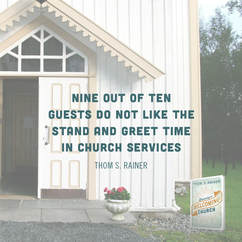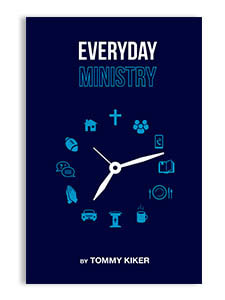 After living in Florida for almost 2 years, we finally took the plunge. We went to Disney. And we survived. After nearly 20 miles of walking, buying the most expensive tub of popcorn I've ever seen, standing in lines, and seeing endless Storm Troopers... we're hooked. We're in. Thank you Disney for Florida resident passes! Amidst it all, I want to try to pull a few leadership lessons: 1. Details Matter - I was geeked out at the parking at Disney. Not that the lots are huge or the trams are constant or that we got to park in the Heroes lot. But I was geeking out over how much detail goes into something as mundane as parking. It's a coordinated symphony where every car has a spot, tram operators can tell you based on the time of your arrival where you parked, and how clear the lines and traffic ways were. In leadership, we can't overlook how important the details are. Typos in our publications happen, but if we're attentive to detail we'll make sure we pay attention to the little things. Even how Disney employees are taught to point proves their attention to detail. 2. Excellence - One of the coolest parts about Disney is that it's never done halfway. Even when it's the same show or presentation, it's always done with excellence. Sure it gets old for the performers, I don't know how it couldn't. I mean, I bet even the mechanics in Small World get tired of it. Whenever we do anything in leadership, it should be done with excellence because whatever we do in leadership is done for God, to the benefit of His people, for the praise of Jesus' name. 3. Cleanliness Speaks Volumes - After a long day, the most expensive tub of popcorn I've ever bought got knocked over by our 3 year old. Luckily, it came with cheap refills. In the 10 minutes that I walked back to get a refill, the mess had already been cleaned up. Disney's maniacal obsession with cleaning is famous. The way we treat our facility speaks volumes to guests. If we're happy with clutter, trash, and unkept flowerbeds, lawns, and pews, it says much more than what our website or preaching says.  4. Experiences Should Be Felt - When people go to Disney, they don't go for thrill rides. We had to explain that to our 7 year old who wanted to ride roller coasters all day. It's all about the experience of waiting in lines, seeing the characters, being immersed on the rides, and soaking in the whole range of emotion and wonder. Our leadership can learn a lot from that, not to manipulate people by forcing an experience, but to make sure that we're putting people in a place to not only hear truth, speak truth, but feel truth. Is your lighting too bright? Too dim? Is the volume too high or low? Is there clear signage? Do people feel welcomed by friendly and engaging faces? 5. Find Ways to Simplify - Too often our leadership and ministries operate like a crowded area, tons of activity going, lots of commotion, and more happening than we could ever take in. And yet in the middle of all that is a Disney way to simplify -- the FastPass+. With the FastPass+, you can select 3 attractions ahead of your time there. That way, you can plan your day without the chaos of navigating a park filled with thousands of people looking around for what's next. Sure, there's still standby lines, but we found the FastPass+ process to simplify and take a lot of the pressure off our Disney trip. As leaders, we have to find ways to simplify what we do. Can our people explain what our mission statement is? Can people explain our process for discipleship and assimilation? If not, we're too complex. That's where I've found the Simple Church model so useful. My dream for our church is to someday embrace Connect-Grow-Go. Three words that tell us how we achieve our mission of "Building Strong Families in Christ."
1 Comment

This week's episode is all about Portable Ministry for younger ministry leaders. Many of our churches are operating with a portable mindset, using rented space for worship gatherings but maintaining separate office spaces. Whether your church meets in a movie theater, a school, or a YMCA gym, there are some unique challenges and opportunities presented.
I was glad to get to talk about this with Michael Kennedy, Lead Pastor at North River Church in Parrish Florida (our "next door neighbor" church).  I loved my time in seminary. In fact I liked it so much, I went back for another degree! Seriously though, I credit my time in seminary working on my masters and doctorate for so much of my spiritual and ministry formation. The challenges in the classroom, the lessons from reading, and the sanctification of a dissertation process come up on a daily basis in pastoral ministry. But it didn’t cover everything. That’s why I found it particularly helpful to pick up and read a book specifically on the things we don’t learn in seminary. Even as Dr. Mohler acknowledges in the foreword, there are some things that aren’t covered as well in seminary as they should. You can never retain every single thing you read in your studies, the seminary experience isn’t intended to capture every single thing you’ll encounter in ministry. For that, we need the local church. Seminary provides, as Robinson describes in his chapter, the basic training. It’s the “relatively safe place for acquiring the tools for ministry” (p. 21). The local church, on the other hand, is the battlefield. And it’s there where our training can be implemented. That training is put into practice through the love that we show to our people, not just our church members but also our families. The foundations of biblical theology, doctrinal fidelity, and exegesis in seminary provide the fuel for us to not only know how to love people, but also provide us the motivation why we love people. One chapter, written by Danny Akin, is exclusively devoted to the task of making sure to love your wife well (in true Akin fashion it’s an alliterated exposition through Ephesians 5). Another chapter on the importance of modeling before our children a love for the local church is helpful as I raise my two boys to not only love Jesus but to love the Church and ministry. The rhythms of our ministry and family time are often a dance more than a line graph, but that’s where it’s important for us to remember that our churches can always find another pastor, but our kids can’t find another dad. Beyond the love of people is the importance of loving the place where we serve. I resonated with Higbie’s chapter on pastoring people different than you. I’m a suburban-born, coffee-snob Millennial. One ministry assignment was in a small rural college town (we had a farm across the street from our house, so to me that meant we lived in the “boonies”), and now I serve in a largely retired area. Fish out of water doesn’t begin to describe it. But when God calls us to a people, he also calls us to a place. And that’s something we don’t learn in seminary, how to navigate a very different area than who we are. Because we’re all interim (p. 46), we need to make the most of our time wherever we are. And that means we shepherd well, trusting in the sufficiency of the Word to meet our needs and the needs of the people we’re loving and caring for through the reality of living in a fallen world.  Learning to lead in seminary is typically done in a safe, controlled environment. Most of us who attended seminary were also part of churches that had significant seminary influence. So they functioned like a laboratory. There were controls in place, elders & pastors were trustworthy and faithfully teaching, deacons and other lay leadership had strong biblical foundations. But in most of our churches after seminary, we learned that leadership doesn’t happen in the controlled setting. It happens in a messy way. Which is why we have to key in on what biblical leadership looks like, and how crucial it is for us to take a long view on leadership in the local church. But that leadership also takes on the shape of suffering, which is an inevitable reality in any ministry. I’m writing this review the morning I’m doing a funeral for a man in our church who lived a full life but in his last years was blind, going deaf, and suffering from dementia, leaving behind a widow with a broken heart and poor health. It’s through these painful moments that hope becomes a reality for us to share with our people. Conflict in ministry is something that I didn’t feel ready for. I’d always read about conflict, had done case studies in seminary, and even got to learn from sitting under a great leader how to navigate conflict. But none of it could prepare for me the person sitting in my office saying he was going to make sure I was fired, or for the anonymous letters, or for the business meetings that turned into firing squads on other church leaders. I found Thomas’ presuppositions so helpful: 1) Conflict must be dealt with, 2) Only the Gospel can heal, and 3) Christ-Centered love is the final goal (p. 95). But the greatest conflict we’ll wrestle with as pastors is our own wars within our hearts, the fight for our own relationship with God. In the seminary vacuum, you’re surrounded by community, you’re saturated in the Bible, and it’s inescapable to be sharpened by the Spirit. In the daily grind of ministry, it’s up to us to fight the war for our souls’ health by prioritizing our own spiritual growth.
Finally, something to emphasize and re-emphasize to my generation is the importance of putting down roots and avoiding the trapping of pursuing our own name’s glory. Too often we have a dream of the “ideal” ministry setting, when in reality the ideal setting is right where God has us. If He calls us elsewhere, it’s a different story. But rather than see our ministry position as a stepping stone or a chance to build a brand, we need to see them as an opportunity to invest our lives for God’s glory among His people, caring for His Bride, and leading her faithfully. For those who are serving in ministry, regardless of their tenure length, this book would prove invaluable as a tool to learn and apply what we couldn't learn in seminary but need every day in our ministry. Thank you Crossway for providing a review copy! 
You can run, but you can't hide! Easter will be here before we know it. In this week's episode, I had six things for U40 Ministry Leaders.
1. Be intentional with visitors 2. Encourage Hospitality 3. Carve out Family Time 4. KISS - Keep It Short & Simple (or Keep It Simple, Stupid) 5. Create & Maintain Traditions 6. Follow up! Check us out on Twitter and give suggestions for future episodes!  In grade school we used to always talk about what we'd do if we ran the school. Usually it included extra recess, no math, and candy bars everywhere. There's a reason why fifth grade student councils don't get a ton of input into things. A lot of us in leadership do the same thing, except instead of candy bars in the cafeteria we dream of having everything exactly the way we like it. Leadership becomes us imposing our preferences on people -- so we say something like "I'm gonna make them do something they don't want to do, and like it." What our vision becomes for where we serve is for it to look like us and what we are most comfortable with. But leadership is about being uncomfortable. For one we're never comfortable with the status quo, because if we're ever comfortable we're in holding patterns. And holding patterns turn into inertia which turns into decay which turns into death. But we're also uncomfortable because we're willing to defer our preferences for what's best. Whether you're serving in a church, ministry, nonprofit or business, leaders are always striving after what's best for the body rather than what's best for themselves. And that means you'll be uncomfortable at times. It means you'll have to sit through difficult procedural discussions even though Roberts Rules often kills vision more than builds it. It means you'll lead meetings you don't want to. It means you'll repeat traditions and practices you think are silly but the people you serve truly value. In church life, it might be you're not doing the music style you prefer. Whatever the case may be, if you're not willing to embrace being uncomfortable for the sake of others, you may want to ask if you're called to leadership. Uncomfortable Defers - When we insist on things being done our way, we turn from servant leadership to at best a benevolent autocrat. But when we're willing to defer to what's valued and appreciated by people, we're not only closing barriers we're building relationship capital. It's the same thing we do in a marriage where we are willing to defer our preferences for the sake of our spouse out of love for them. Uncomfortable is Patient - You might have something you're dealing with that really is counter-mission, and is an unnecessary distraction of time/money/volunteers. But if you're willing to be patient, you can have lasting impact by waiting for things to die on their own. Often times, if you're setting a good pace and creating a healthy culture, those unnecessary things will starve out. Uncomfortable is Wise - You shouldn't be uncomfortable over everything. There are some things that require immediate action. If you're in a situation where money is being mishandled, fix it. Don't wait for the people who handle it to retire. If you're in a situation in ministry and there's heresy being taught/promoted, deal with it. But for the 95% of other stuff that bugs us, be wise. You can kill a fly with a newspaper or a grenade. Wisdom is knowing when to use what. If we're willing to embrace being uncomfortable as leaders, and can be patient for things to work out in a healthy way, we'll see effective and fruitful leadership as the result. 
Ministry is dependent on a currency of trust that's formed through relationships. That's what I'm talking about on this week's episode of the U40 Ministry Leader podcast. Subscribe on iTunes or Google Play and give feedback on our Twitter account: @U40MinistryLead
I also explain the joy of taking a 3 year old to the bank.  Whenever we plan out our worship services, we try to come up with ways to engage our guests and visitors, those who might be new to our worship. So we plot out talking points, transitions, clear instructions and reference points in our bulletins, and we might even provide a listening guide for the message. All of these planning moments are done knowing that when Sunday worship starts, there are going to be people who may have no idea what's going on. Beyond that though are the unintentional things we do in our worship. And these more often than not I believe are driven by using the wrong sets of eyes. Instead of asking if it's something that will be understood by a visitor, we end up creating barriers for those we're trying to reach. Thom Rainer's book on Becoming a Welcoming Church is an eye-opener for us (pun intended). When we start viewing things we do through the eyes of an outsider, it should give us pause on the value of continuing them. We do this three ways: 1. Insider Language - Let's be honest, we have our own language. It's called Christianese. It uses words that don't make sense unless you're part of our Christian subculture. For someone who comes from a nominal or non-existent church background, they may be confused when we call someone brother or use acronyms or code words. Instead of assuming knowledge, assume you need to explain what things mean to your potential visitors. 2. Insider Rituals - Yes. I'm going there. The hand shaking time. When polled, 90% of visitors feel uncomfortable with the obligatory greeting time most of our churches do. I became a Christian in high school and I'll never forget asking my buddy who'd led me to Christ what we were doing. He said "We're greeting each other," and my response was "So the 20 minutes of saying hi before service don't count?" I'm not discounting the value of intentionally greeting people. But what I am suggesting is that we work to make sure we're not putting up an intentional barrier preventing guests from feeling at ease among our fellowship. 3. Insider Groupings - Most of the time when churches advertise themselves as friendly, they often mean "We're friendly with ourselves." Huddles often happen in churches when insider groups form that aren't considered open table to guests and visitors. So we create in-groups that can devolve into cliques. It's not just in youth ministry that church cliques can form. Our groups should be close. They should be friendly. There will naturally be relationships and friendships and even inside jokes. But never at the expense of the open invitation to the empty seat. So what do we do to address these insider habits? 1. Have an outside perspective - Whether you pay a "Secret Shopper" or you just have a friend from another church come in and give their impressions, it's important to have outside eyes help you see what you're missing. Same reason why the burned out light bulb in your house doesn't bother you anymore, you've grown accustomed to it. 2. Follow up with guests - Who better to get insight into your church culture than your guests! Allow them to give you feedback about their experience, their welcome, their introduction to a small group, their impressions of your music/environment/preaching, and how their kids liked their time with our children's and youth ministry. Most of the time you'll get pleasantries, but you'll get good honest constructive feedback sometimes. Listen to it. 3. Develop a culture - Leaders, it starts with us. Be intentional about engaging unfamiliar faces. Be intentional about inviting people to worship. Stress it often from the pulpit or classroom or publication the importance of being guest-minded. Multiply small groups so there are additional opportunities to assimilate new people. Create tangible goals for small group teachers to recruit, identify, and deploy a new teacher every 12-18 months for the class to grow by multiplying. But above all the planning and strategy, labor to create a culture that loves guests. 4. Pray - It should be first but it's last on the list as a powerful reminder that none of this matters if we're not fervently, expectantly praying for guests. Prayer changes the one praying, and when we deliberately begin praying for outreach and engagement, it puts in us a newfound love and passion for making Jesus known in our neighborhoods and beyond.  Yesterday I preached from 2 Timothy 4 where Paul lays out the final instructions to his protege, Timothy. One of the things he told Timothy to do as a pastor was to "endure suffering." One of the unmistakeable realities of ministry is that it's hard. Whenever you deal with people and live in between the heavenly and the temporary, it's messy. You'll be heartbroken when people you love mess up, you'll be discouraged when your best ideas are duds, you'll be frustrated when week after week you labor faithfully and don't see any visible fruit. Endure suffering. Why? Because if God's the one who called you to ministry, God's the one who will see you through your difficult days. He'll see you through when you want to walk away. He'll see you through when you're laboring and not seeing any fruit. He'll be there on Monday morning when you want to just walk away because the weekend went flat. Anyone else had one of those Mondays? Most of the time the suffering we deal with isn't the obvious, it's the cumulative effect of the daily labor. What does it look like Physically, Emotionally, and Spiritually to endure? Physical Suffering - Sometimes your body will remind you it's not perfect. Yesterday I had the joy of preaching with back spasms. If you've not done that before, it's not fun. Other times you'll fight having the stomach bug, flu, twisted ankles, or major sickness. For most of us we get too little sleep, exercise too little, and eat too much. Remember, in your weakness God is most strong. And in the meantime, dust off your running shoes, eat a salad, and go to bed before midnight. Emotional Suffering - When we suffer emotionally it's often because we're at the point where we find ourselves carrying so much from others that we can't process it anymore and our emotions are spent. Not surprising, it's connected to our physical suffering. Because when we're tired and anxious we're more likely to be affected emotionally. Even Jesus pulled Himself away from the crowds to recharge the batteries. If Jesus needed to, so do you. Spiritual Suffering - Ministry is tough. And it's even tougher when we're wandering away from God by not making sure our own souls aren't nourished. It can be so easy to take what we do vocationally and overlook the fact that first we're adopted as God's children. So our spirit suffers because we're squeezing every bit of us out into our work, while not coming back to the source ourselves. We find ourselves resenting our time with God because it "interrupts our productivity" or we forget what it's like to marvel and delight at the presence of God. This happens when we neglect to take our day off, we neglect to use vacation days, or we neglect getting away for conferences/retreats. Ministry is tough. That's why it's not for the weak of heart. But for those called, they're carried by the strong arms of the God who loves them. 
I was so glad for this episode of the podcast to be joined by Nathaniel Miller, who serves as the Music Minister with me at Emmanuel. We had a very fruitful discussion of what music & worship looks like in the local church, and how younger leaders can be more effective in how they help guide a congregation or ministry in worship.
For those who are in the preparatory phase (as a volunteer, in Bible college or seminary), dive in and do as much as you can without getting burned out. All of those opportunities can help you grow. And for those serving in a church, the way we lead and set up our worship services is many times for us to get out of the way. So we try to remove whatever might be a distraction, whether it's musical style or volume or direction. We lead graciously, we lead with patience, and we lead while teaching. So in your transitions in worship, use that time to talk about not only what the song says, but what it means. Lastly, if you're a lead pastor and you're not regularly spending time with and talking with your worship leader, you're doing it wrong. Invest in them. Your worship services will better reflect that partnership in ministry.  I picked up a little book from a pastor's conference a few weeks ago I finally got to read today. It's called Everyday Ministry, written by Tommy Kiker, who is on faculty at Southwestern Seminary in Texas. What I appreciated most about the book was its accessibility and clear trajectory - this is a book written to help ministry leaders (and prospective leaders) figure out what God's doing in their lives. The C's have often been used to describe a profile for ministry. Bill Hybels used Character, Competence, and Chemistry. Ron Edmondson uses Character, Commitment, and Competence. Lifeway Leaders uses Character, Conviction, Care, and Competency. I even threw my hat in the ring with my list of Calling, Character, Competency, and Chemistry. The point behind all of that is to show that a call to ministry is more than an ethereal feeling or supernatural pull. It's embodied in our salvation story where we're first found in Christ before we're found in a pulpit. It's also in the confirmation process that a leader goes through where others are a part of the calling-out process. Kiker draws from the idea of someone feeling called to ministry but not having any church or other leaders affirm that call--it likely means that person isn't fit for ministry. But there's also a skill set involved, which is secondary to character. And that's where we have to remember the difference between a fruitful minister and a successful businessman. Talent can take someone far in coaching, business, or other fields. But for ministry, our "success" is only found as far as our character will take us. Accountability with our spouses, with our time, with our integrity, money (personal and church), and how we guard not only our eyes but our hearts (Kiker even delves into the "Billy Graham Rule" on being alone with another woman. The take home point was essentially "When it comes to money or women, hands off if it's not yours." I'd be curious to know how many out there who preach regularly are able to preach without using notes. The text-driven preaching model taught and modeled at SWBTS lends itself to being freed up from using notes. And it's personal, but I don't trust myself with my ADHD and general forgetfulness to not at least have a cheat sheet with me. I can ski without poles, but I'm always grabbing them before hitting the slopes, just in case. So how about you? Do you use notes? An outline? Manuscript? How much do you take with you? Have you ever tried going without notes? Leave a comment! |
Scott M. DouglasA blog about leadership and the lasting legacy of family ministry. Archives
August 2023
Categories
All
|
 RSS Feed
RSS Feed



